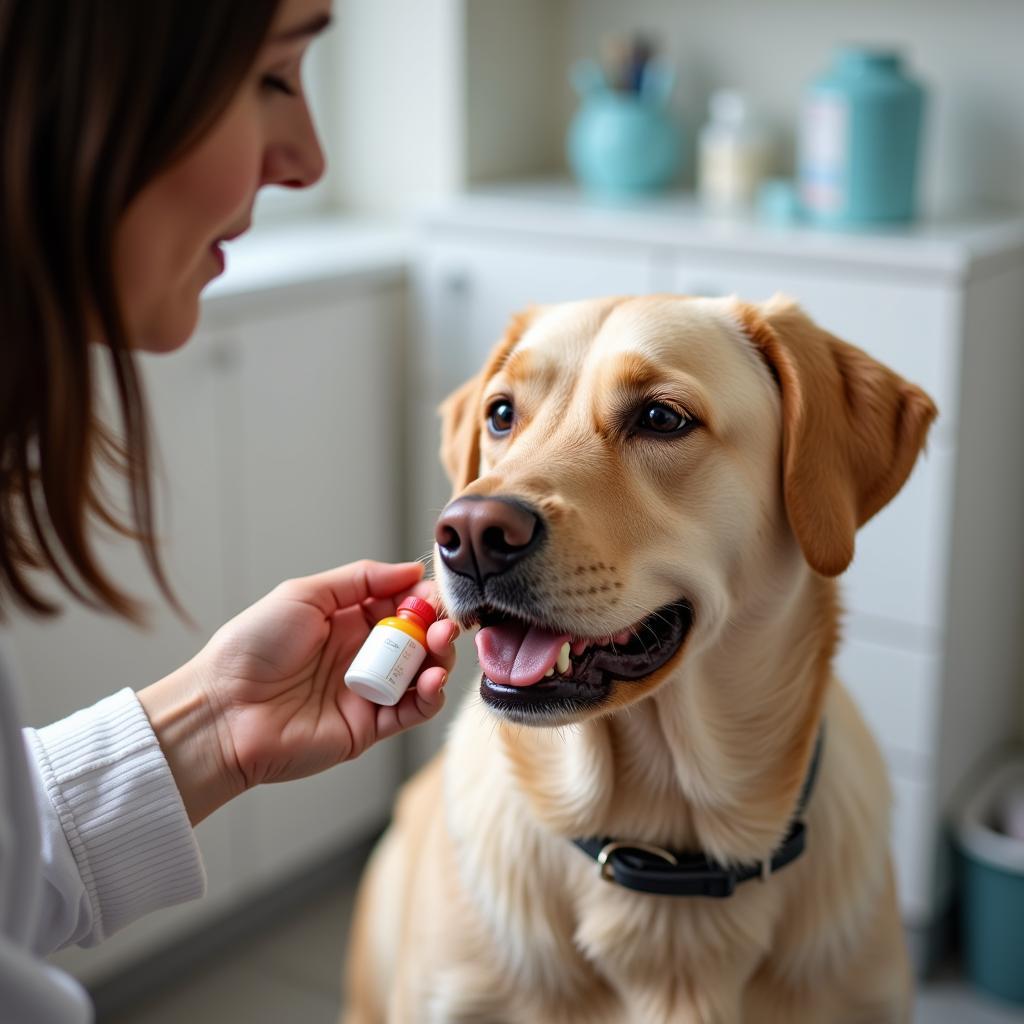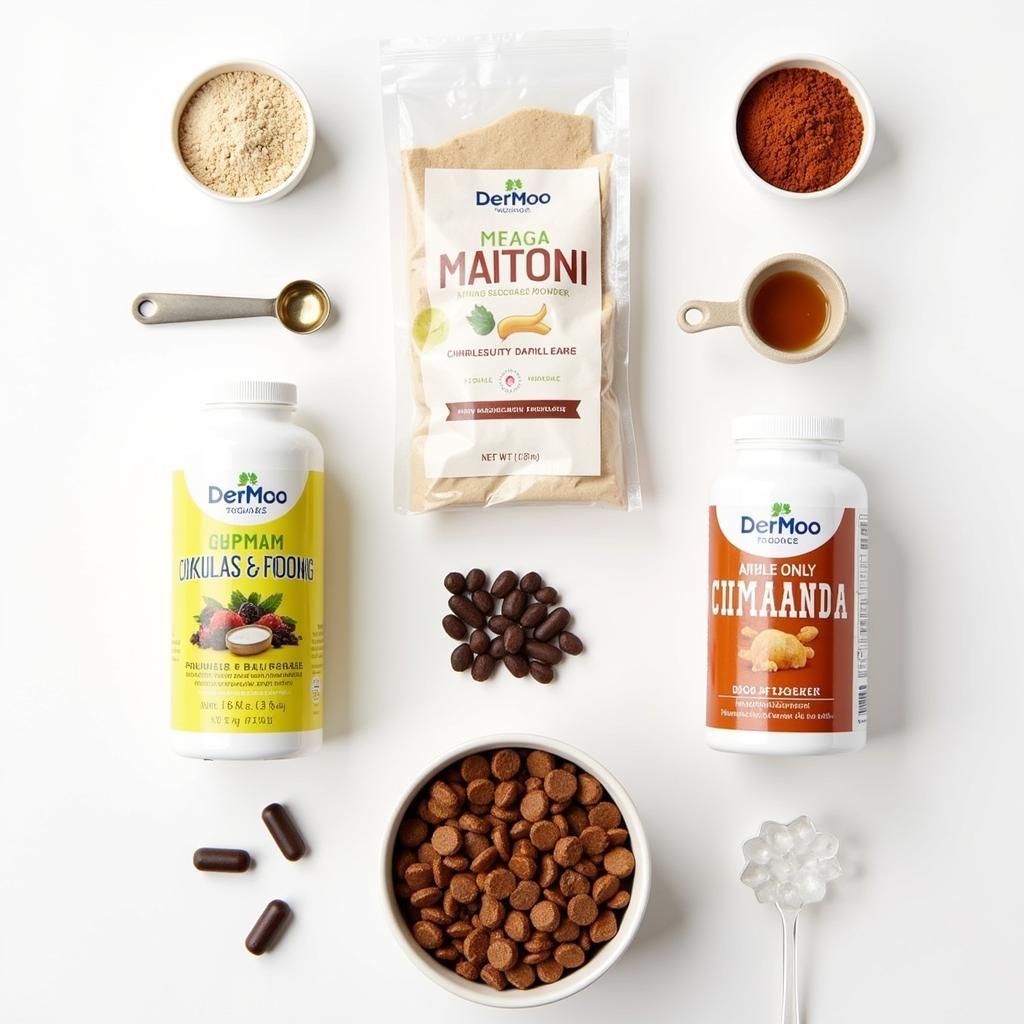Giving your dog the best nutrition is a top priority for every pet parent. Homemade dog food offers incredible control over ingredients, but ensuring complete nutrition requires careful supplementation. That’s where choosing the Best Homemade Dog Food Supplements comes in. These crucial additions bridge the nutritional gaps, ensuring your furry friend thrives on a balanced diet. Supplements provide essential vitamins, minerals, and other nutrients not readily available or consistently present in home-prepared meals.
Homemade dog food allows you to tailor your dog’s diet to their specific needs, whether they require best anti inflammatory dog food or have other dietary restrictions. However, creating a fully balanced meal for your canine companion requires an understanding of their nutritional requirements. Without the correct balance of vitamins and minerals, your dog could suffer from deficiencies, leading to health problems down the line. Choosing the best homemade dog food supplements can prevent these issues, offering peace of mind knowing your dog is getting everything they need to thrive.
Why Are Homemade Dog Food Supplements Important?
Just like humans, dogs need a balanced diet to maintain optimal health. While whole foods provide a foundation, supplements act as insurance, filling in any nutritional gaps that might exist. They’re especially crucial for homemade diets, which, while well-intentioned, can sometimes lack specific nutrients if not carefully formulated.
Essential Vitamins and Minerals
Dogs require specific vitamins and minerals for vital functions like bone growth, immune system support, and energy production. Supplements help ensure these needs are met, especially when dietary variety is limited. Calcium, phosphorus, and vitamin D are vital for bone health, while antioxidants like vitamin E and C support immune function. A complete vitamin and mineral mix for homemade dog food can simplify this process, providing a pre-mixed blend of essential nutrients.
Addressing Specific Needs
Supplements can also address specific health concerns. For instance, dogs with joint problems might benefit from glucosamine and chondroitin, while those prone to allergies could benefit from omega-3 fatty acids.
Choosing the Right Supplements for Your Dog
With a plethora of options available, navigating the world of dog supplements can feel overwhelming. However, armed with the right knowledge, you can make informed choices that support your dog’s health.
Consult Your Veterinarian
Before adding any supplements to your dog’s diet, always consult your veterinarian. They can assess your dog’s individual needs, considering factors like breed, age, activity level, and any existing health conditions. They can also help you determine appropriate dosages and identify potential interactions with medications.
Focus on Quality and Sourcing
Opt for high-quality supplements from reputable brands that prioritize ingredient sourcing and manufacturing processes. Look for products made with natural ingredients and avoid those containing artificial fillers, colors, or flavors.
Consider Your Dog’s Life Stage
A puppy’s nutritional needs differ significantly from those of an adult or senior dog. Puppies require higher levels of certain nutrients to support their rapid growth, while senior dogs may benefit from supplements that address age-related issues.
 Senior Dog Receiving Vitamin Supplements
Senior Dog Receiving Vitamin Supplements
Incorporating Supplements into Homemade Dog Food
Once you’ve chosen the right supplements, incorporating them into your dog’s food is straightforward. Follow these simple steps for a smooth and successful integration.
- Start Slowly: Gradually introduce new supplements to avoid digestive upset.
- Mix Thoroughly: Ensure even distribution by mixing supplements thoroughly with the food.
- Monitor Your Dog: Observe your dog for any changes in appetite, stool, or overall health.
“Supplementing a homemade diet is an art, not a science,” says Dr. Emily Carter, DVM, a renowned veterinary nutritionist. “It requires careful observation and adjustments based on your dog’s individual response.”
Looking for dog food made in your local area? Check out options for dog food made in texas. You might be surprised by the variety available!
What is the cost of supplementing homemade dog food?
The cost of homemade dog food can vary depending on the ingredients used. Supplementing a home-prepared diet isn’t necessarily more expensive than feeding commercial kibble, especially when you consider the potential long-term health benefits. However, understanding your dog’s specific needs and choosing appropriate supplements will impact the overall cost. Remember, investing in high-quality supplements is an investment in your dog’s well-being.
What about pre-made supplement mixes?
Pre-made vitamin and mineral mix for homemade dog food can simplify the process, ensuring balanced nutrition without the need for multiple individual supplements. These mixes are formulated to meet specific canine nutritional requirements, saving you time and effort.
 Variety of Dog Food Supplements
Variety of Dog Food Supplements
Have you heard of Otto dog food? It’s a popular brand known for its high-quality ingredients. Learn more about Otto dog food and its potential benefits for your furry friend.
Conclusion
Providing the best homemade dog food supplements is a crucial aspect of responsible pet ownership. By understanding your dog’s individual needs and selecting high-quality supplements, you can ensure they receive the complete nutrition required to thrive. Consult your veterinarian, prioritize quality ingredients, and monitor your dog’s response to ensure the best possible outcome. Choosing the best homemade dog food supplements is a vital step in nourishing your canine companion and supporting their long-term health and happiness.
FAQ
- Are supplements necessary for homemade dog food? Yes, supplements are often necessary to ensure balanced nutrition in homemade diets.
- What are the most important supplements for dogs? Essential supplements often include a vitamin and mineral mix, omega-3 fatty acids, and joint support supplements.
- How do I choose the right supplements? Consult your veterinarian for personalized recommendations based on your dog’s needs.
- How do I introduce supplements to my dog’s diet? Start slowly and gradually increase the dosage to avoid digestive issues.
- Can I give my dog human supplements? No, human supplements are not formulated for dogs and can be harmful.
- Are there any risks associated with dog supplements? While generally safe, some supplements can interact with medications or cause side effects. Consult your vet.
- Where can I buy high-quality dog supplements? Reputable pet stores and online retailers often carry a wide selection.
Need more help? Contact us! Phone: 02437655121, Email: minacones@gmail.com or visit us at 3PGH+8R9, ĐT70A, thôn Trung, Bắc Từ Liêm, Hà Nội, Việt Nam. We have a 24/7 customer service team.